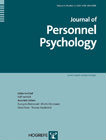Journal of Personnel Psychology Special Issue – Call for papers
21.01.2013
 Insights Beyond g – Specific Cognitive Abilities at Work
Insights Beyond g – Specific Cognitive Abilities at Work
Guest Editors: Stefan Krumm (University of Muenster, Germany), Lothar Schmidt-Atzert (University of Marburg, Germany), Anastasiya A. Lipnevich (The City University of New York, USA).
Submission deadline: June 30, 2013
The Journal of Personnel Psychology (JPP) announces a special issue focusing on specific cognitive abilities at work.
In 1991, Ree and Earles concluded that “not much more than g” was necessary to predict performance criteria at work (in their case training performance). This conclusion was echoed a decade later by Viswesvaran and Ones (2002) in their special issue: “All authors […] agree that there is not much more validity to be gained from specific abilities than g” (p. 216). However, applying statistical advancements that were available another decade later revealed that specific cognitive abilities “also have an important role” (Lang et al., 2010, p. 626) and may even be of higher predictive validity than g. Specific cognitive abilities, broadly defined as abilities narrower than g, however, are not only worth examining with respect to their predictive validity on I-O-related criteria. More importantly, if specific cognitive abilities tap distinct cognitive processes, they have the potential of providing insights into the cognitive processes involved in executing work-related tasks, thereby increasing our knowledge as to why a particular job-performance domain is contingent on g. E.g., some authors showed that cognitive processes rooted in working memory are particularly important in multitasking and in solving complex arithmetic problems (Bühner et al., 2006; Krumm et al., 2012). Those efforts are complemented by recent theoretical models focusing on work-related activities assuming specific cognitive processes as drivers of performance. The Search for Ideas in Associative Memory model (SIAM; Nijstad & Stroebe, 2006), for example, maintains that idea generation in groups is limited by the group members’ working memory capacity. Other models including cognitive processes are available for several work-related activities (team decision making, dual task performance, etc.). In sum, looking behind the scenes at both, the predictor side and the criterion side has been a fruitful endeavour. The special issue aims at contributing to this growing body of research.
The proposed special issue intends to present studies that
-
link specific cognitive abilities (such as domain-specific knowledge, working memory, executive functions, etc.) with specific performance domains in I-O psychology and explain variance beyond the g-saturation of predictor and criterion,
-
advance theories on / our understanding of cognitive processes involved in work-related performance domains,
-
present methodological advancements in identifying broad and narrower cognitive abilities as predictors of I-O related criteria,
-
advance our understanding of when to use general and when to use narrower cognitive predictors.
Specific cognitive abilities may include, but are not limited to: domain-specific knowledge, working memory, short-term memory, executive functions, attention, mental speed, etc. We also highly welcome contributions covering cognitive processes from the realm of experimental psychology that provide insights on their applicability and usefulness in work settings. While we welcome both empirical and purely conceptual manuscripts, we particularly encourage the submission of empirical papers.
Method of submission: Manuscripts, which should be clearly labelled as submissions intended for this special issue, must be submitted through JPP's online review system, Editorial Manager, in accordance with regular JPP guidelines (see here and here). All submissions will undergo a double-blind peer-review process, using the normal JPP review criteria while also taking into account the contribution of the paper to the topic of this special issue.
Deadline for submissions is June 30, 2013.
Informal enquiries on the Special Issue can be made to Stefan Krumm ([email protected])
Download PDF

